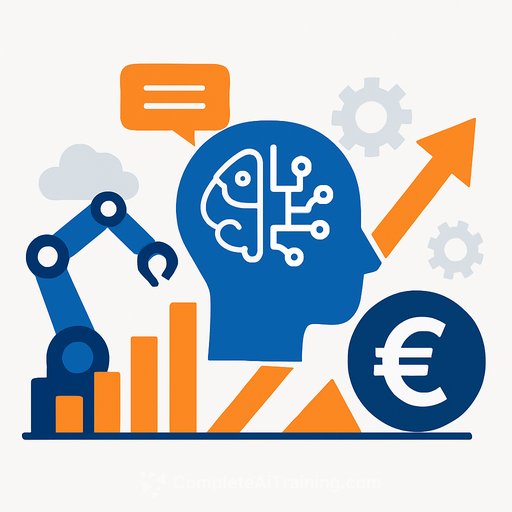Google's €5B AI build-out in Belgium: what it means for engineers, teams, and investors
Google (NASDAQ: GOOGL) is committing €5 billion to expand AI infrastructure and data centers in Belgium. The money lands across 2026-2027 and strengthens Europe's compute, storage, and energy footprint for AI workloads.
For IT and development teams, this is a capacity signal. Expect more GPUs, lower latency options in Western Europe, stronger data residency choices, and a bigger push on carbon-free operations.
What's being built
- Expansion of the existing Saint-Ghislain campus plus a new campus in Farciennes (Wallonia).
- Estimated 300 new full-time roles at Google Belgium and ~15,000 indirect jobs per year via contractors and partners.
- Free, practical AI training funded for low-skilled workers to narrow the skills gap.
- Facilities engineered to run on carbon-free energy by 2030, with new agreements involving Eneco, Luminus, and Renner to support onshore wind in Belgium.
The move supports Google Cloud services and core products such as Search, Maps, and Workspace while scaling AI training and inference capacity in the region.
Why it matters for engineering leaders
- Data locality and compliance: More EU-based options help meet data residency requirements and keep sensitive workloads closer to users.
- Latency and throughput: Proximity to Benelux and nearby markets can cut tail latency for user-facing services and speed up data pipelines.
- AI capacity: Expect higher availability of high-performance GPUs and accelerators for training and inference, plus stronger networking and cooling stacks.
- Sustainability: Carbon-free operations targets encourage carbon-aware workload scheduling and reporting for ESG goals.
Market context and policy fit
This build-out fits the EU's push for digital sovereignty and localized processing. It supports Europe's Digital Decade targets for infrastructure and skills.
For background, see the EU's Digital Decade framework and Google's 24/7 carbon-free energy commitment.
Who benefits
- Google (NASDAQ: GOOGL): Stronger AI and cloud position in Europe.
- Semis: NVIDIA (NASDAQ: NVDA) and Advanced Micro Devices (NASDAQ: AMD) as demand for GPUs and accelerators grows.
- Energy: Eneco, Luminus, and Renner with long-term wind agreements.
- Build-out partners: Construction, networking, server, and cooling vendors; specialized data center services (security, maintenance).
Where pressure rises
- Hyperscalers: Microsoft Azure (NASDAQ: MSFT) and Amazon Web Services (NASDAQ: AMZN) may match spend to defend share.
- Startups: Bigger players set the pace; smaller firms need focus, partnerships, or niche depth to compete.
- Talent: Hiring tightens for AI/ML, data, reliability, and security roles across Belgium and the EU.
Practical moves for IT and dev teams
- Workload placement: Map services with strict residency rules to EU regions; plan migration playbooks for Belgian zones as they open.
- MLOps readiness: Containerize training jobs (e.g., GKE, Vertex AI), define quotas and preemption strategies, and build repeatable pipelines for model training, evaluation, and deployment.
- Data architecture: Use multi-region buckets in the EU, regionalize feature stores, and optimize data movement to cut egress and latency.
- FinOps: Tag everything, set budget alerts, apply committed use discounts and spot capacity where feasible, and track GPU utilization at the job level.
- Sustainability: Pilot carbon-aware scheduling windows and report compute emissions alongside SLOs; consider CMEK and regional KMS keys in the EU for compliance.
- Security and compliance: Refresh DPAs, update key management, and validate logging, SIEM, and incident response coverage for new regions.
- Skills: Stand up an internal AI curriculum and certify teams. For structured pathways, see AI courses by job.
What to watch next
- Construction milestones at Saint-Ghislain and Farciennes, including grid connections and energy project progress with Eneco, Luminus, and Renner.
- Hiring momentum and announcements on training programs in Belgium.
- GPU and accelerator availability, network upgrades, and region/zone launches that affect deployment plans.
- EU policy updates on privacy, model governance, and AI safety that influence architecture and compliance.
Bottom line
Google's €5 billion Belgium investment increases Europe's AI capacity, strengthens data locality options, and pushes the industry toward cleaner compute. Expect faster build cycles, tighter talent markets, and active responses from other hyperscalers.
If you build or run AI systems in Europe, prepare migration paths, modernize MLOps and FinOps, and set carbon-aware practices now. The teams that plan early will ship sooner and control costs better as capacity comes online.
Disclaimer: This content is for informational purposes only and is not financial advice.
Your membership also unlocks:






